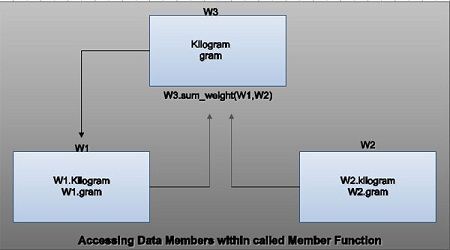The objects of a class can be passed as arguments to member functions as well as nonmember functions either by value or by reference. When an object is passed by value, a copy of the actual object is created inside the function. This copy is destroyed when the function terminates. Moreover, any changes made to the copy of the object inside the function are not reflected in the actual object. On the other hand, in pass by reference, only a reference to that object (not the entire object) is passed to the function. Thus, the changes made to the object within the function are also reflected in the actual object.
Whenever an object of a class is passed to a member function of the same class, its data members can be accessed inside the function using the object name and the dot operator. However, the data members of the calling object can be directly accessed inside the function without using the object name and the dot operator.
To understand how objects are passed and accessed within a member function, consider this example.
Example: A program to demonstrate passing objects by value to a member function of the same class
#include<iostream.h>
class weight {
int kilogram;
int gram;
public:
void getdata ();
void putdata ();
void sum_weight (weight,weight) ;
} ;
void weight :: getdata() {
cout<<"/nKilograms:";
cin>>kilogram;
cout<<"Grams:";
cin>>gram;
}
void weight :: putdata () {
cout<<kilogram<<" Kgs. and"<<gram<<" gros.\n";
}
void weight :: sum_weight(weight w1,weight w2) {
gram = w1.gram + w2.gram;
kilogram=gram/1000;
gram=gram%1000;
kilogram+=w1.kilogram+w2.kilogram;
}
int main () {
weight w1,w2 ,w3;
cout<<"Enter weight in kilograms and grams\n";
cout<<"\n Enter weight #1" ;
w1.getdata();
cout<<" \n Enter weight #2" ;
w2.getdata();
w3.sum_weight(wl,w2);
cout<<"/n Weight #1 = ";
w1.putdata();
cout<<"Weight #2 = ";
w2.putdata();
cout<<"Total Weight = ";
w3.putdata();
return 0;
}
The output of the program is
Enter weight in kilograms and grams
Enter weight #1
Kilograms: 12
Grams: 560
Enter weight #2
Kilograms: 24
Grams: 850
Weight #1 = 12 Kgs. and 560 gms.
Weight #2 = 24 Kgs. and 850 gms.
Total Weight = 37 Kgs. and 410 gms.
In this example, the sum_weight () function has direct access to the data members of calling object (w3 in this case). However, the members of the objects passed as arguments (w1 and w2) can be accessed within function using the object name and dot operator. Note that, the objects w1 and w2 are passed by value, however, they can re passed by reference also. For example, to pass w1 and w2 by reference to the function sum_weight the function will be declared and defined as
void sum_weight (weight &,weight &) ;
void weight :: sum_weight (weight & w1, weight & w2) {
// body of function
}
Figure shows accessing of member variables inside the sum_weight function;

 Dinesh Thakur holds an B.C.A, MCDBA, MCSD certifications. Dinesh authors the hugely popular
Dinesh Thakur holds an B.C.A, MCDBA, MCSD certifications. Dinesh authors the hugely popular